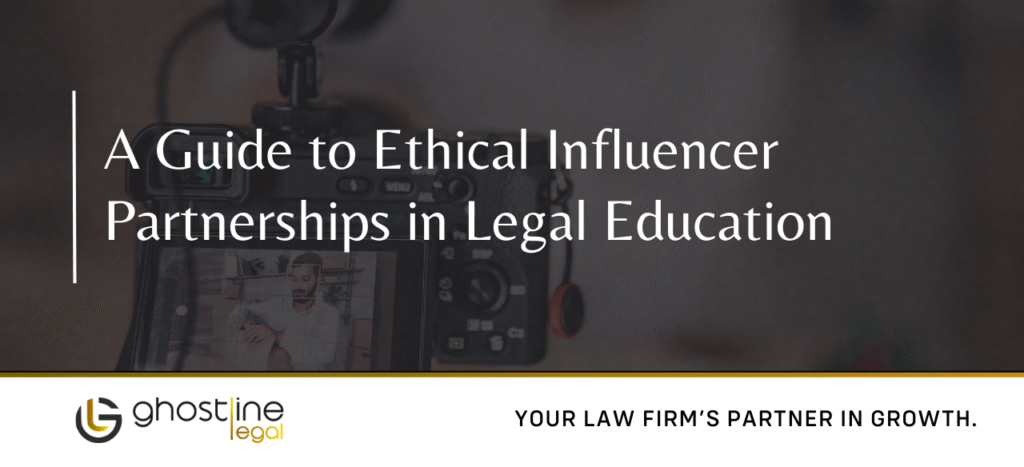This article has been authored by team Ghostline Legal.
The average person isn’t scrolling through their phone looking for a law firm’s blog. They’re watching stories, laughing at Reels, and connecting with creators they trust. This is where influencer marketing comes in. It’s a powerful way to translate complex legal topics into content that people actually want to consume.
Legal information is not like recommending a skin care product. Getting it wrong has real consequences. Partnering with a non-legal creator for a legal education campaign is a fantastic strategy, but it requires a careful, ethical approach.
How do you harness the power of an influencer’s voice without compromising on accuracy or your firm’s reputation? It all comes down to a solid framework for selection, co-creation, and control.
Why Go This Route at All?
Is it worth the effort? Absolutely. A trusted influencer can achieve what traditional advertising often cannot: a genuine connection. They speak their audience’s language and have built a foundation of credibility. When they discuss a legal issue – like the importance of a will, understanding tenant rights, or setting up a business properly – their followers listen. They demystify the law, making it feel accessible instead of intimidating. The aim isn’t necessarily to land a client directly from a single video; it’s about building awareness, fostering trust, and positioning your firm as a modern, approachable authority.
The First Filter: Selecting the Right Creator
Choosing a partner is the most critical step. This isn’t about finding just anyone with a large following. You need a voice that aligns with your values.
Look beyond the numbers. A micro-influencer with 20,000 highly-engaged, loyal followers is often a far better choice than a celebrity with two million disengaged ones. Pay close attention to their engagement rate – comments, shares, saves – as it is a much stronger metric for an education-based campaign.
Audit their content carefully. What is their usual tone? Do they handle sensitive topics with respect? Have they ever shared misinformation, even by accident? Their past content is the best predictor of their future behavior. You need a creator known for authenticity and responsibility.
Find a values match. Does the influencer’s personal brand fit with your firm’s culture? A creator focused on family life could be ideal for estate planning or family law education. A business influencer could brilliantly explain contracts or intellectual property. The alignment must feel natural; otherwise, the partnership will seem like a jarring paid ad.
Gauge their professionalism. Are they responsive and organized? Do they meet deadlines? An influencer who is difficult to work with can derail a campaign before it starts. A preliminary call to discuss the project’s goals is essential.
Building the Content Together
You are the legal experts. They are the content experts. A successful campaign respects both skill sets. This is a collaborative process.
Start with a detailed briefing. Don’t just send a vague email. Host a kickoff meeting or provide a clear document that explains the why behind the campaign. What is the key message? What common myths need to be debunked? What is the one action you want the viewer to take? Provide simple, clear background materials.
Trust their creative process. You know the law. They know how to make a 60-second video that holds attention. Give them the key bullet points that must be included, but then let them brainstorm the creative execution. A funny skit, a heartfelt story, or a straightforward explainer—their intuition for what resonates is what you’re paying for.
Develop approved language together. Work with the influencer to draft the captions and video scripts. This is where you ensure accuracy. Help them find simple, relatable analogies for complex legal concepts. Replace “testamentary capacity” with “being of sound mind.” Swap “power of attorney” for “the legal permission to make decisions for someone else.” This collaboration produces content that is both legally sound and easy to understand.
Ensuring Accuracy
This is the non-negotiable part. While you allow creative freedom, you must have ironclad systems to protect your firm, the influencer, and the public.
Implement a mandatory legal review. Every piece of content – the video, the caption, the stories, the comments they plan to pin – must be reviewed and approved by someone at your firm with the right expertise. No exceptions. This is risk management, not micromanagement.
Use clear disclaimers. Every post must include a visible and unambiguous disclaimer. For example:
- “This is for general information only and is not legal advice.”
- “Every situation is different; please consult with a lawyer for advice on your specific circumstances.”
- “Paid partnership with [Law Firm Name].”
The influencer should seamlessly incorporate this into their caption.
Plan for the comments section. The comments will fill with personal legal questions, which is a significant liability. Agree on a plan beforehand. The influencer should have a prepared, kind response that directs people to official channels, like: “Thanks for your question! Because every case is unique, I can’t answer personally. For more info, check out the link in my bio to contact the experts at [Firm Name].” This funnels potential clients to you appropriately without creating an attorney-client relationship in a public forum.
Prepare for the unexpected. What if the video goes viral and the comments become unmanageable? Designate a point person at your firm to monitor the campaign’s performance and be ready to respond quickly if anything goes off-script.
The Bottom Line
An influencer partnership for legal education is a balance of trust and verification. When done right, it’s a powerful tool for public service and brand building. You empower a trusted voice to share vital information, breaking down barriers between the public and the legal guidance they need.
It’s about meeting people where they are, with a message they can understand, delivered by someone they already believe in.
Your law firm deserves a strong social presence — let’s build it!








